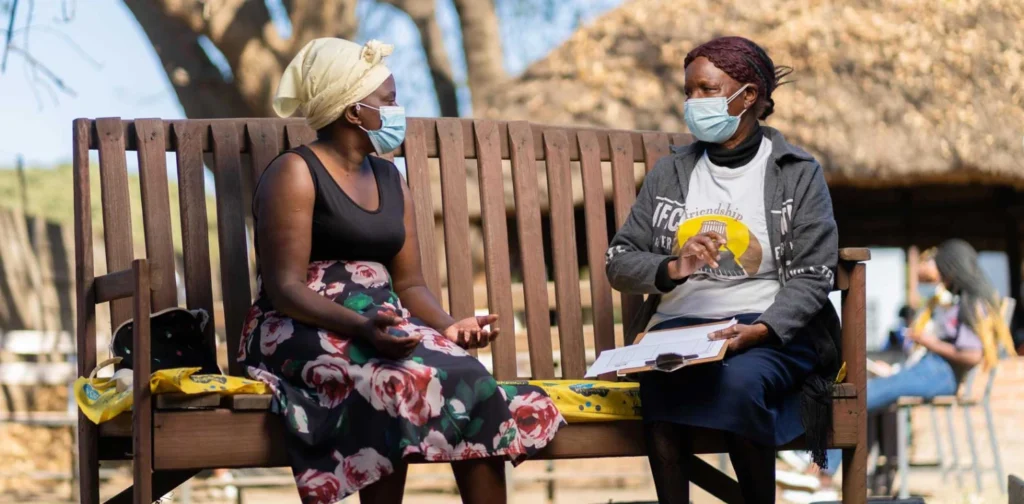How Friendship Bench Bridges Mental Health Care Gap

Photo: Costa Juta on Wikimedia Commons.
Mental health is an integral part of overall wellbeing. However, mild to moderate problems like depression and anxiety are on the rise, especially as we face multiple crises and rapid tech development. Yet, access to mental health services remains limited, particularly in low- and middle-income countries, highlighting the urgent need for inclusive and low-cost mental health solutions. The Friendship Bench initiative shows how a community-based “sit and talk” therapy can serve as a viable mental health care.
Mental Health Care Gap in LMIC
Mental health problems are conditions that impact someone’s feelings, behavior, or thoughts. These problems can occur across the life cycle, from children to older adults, and may stem from life experiences, such as social disadvantage, trauma, loneliness, to physical causes like injuries or neurological conditions.
As mental and physical health are interconnected, care facilities for people with mental health conditions are highly crucial to manage their symptoms and ensure their overall wellbeing. However, regions with high prevalence of mental health issues, like low- and middle-income countries (LMIC), still struggle with treatment gaps in their mental health care.
In LMICs, where a significant portion of the world population lives, over 80% of people have mental health issues. Despite the high number, up to 85% of them do not receive any treatment, largely due to a lack of access to mental health care facilities, a shortage of professionals, and financial barriers.
Moreover, stigmatization of mental illnesses often exacerbates the problem, causing individuals to avoid seeking help. This gap in mental health care highlights the urgent need for low-cost, inclusive, and scalable mental health care interventions, especially in areas with limited resources.
Friendship Bench to Bridge the Gap
Taking care of our mental health can begin with a simple conversation. The Friendship Bench, developed by groups of doctors in Zimbabwe, offers a community-based talk therapy as a mental health treatment.
Community members who seek mental health care are guided to sit and talk with trained community health workers on a wooden bench established in community spaces or primary healthcare clinics. The Friendship Bench uniquely deploys trained local grandmothers to provide problem-solving therapy that highlights listening, empathy, and connection with a non-judgmental attitude. Friendship Bench delivers a primary care level of cognitive and behavioral therapy to address mental health conditions in the community.
Comparison shows that around 48% of standard care patients still experience anxiety symptoms, while Friendship Bench patients experiencing further symptoms after care have a lower rate of 12%. Beyond Zimbabwe, the Friendship Bench has expanded to other countries like Malawi, Kenya, and even to upper-income areas such as New York City and London.
Ensuring No One Is Left Behind
Limited resources and stigma must be addressed as a part of strengthening inclusive mental health care. Low-cost and scalable solutions like the Friendship Bench show that mental health support can be brought closer to the people, especially when adapted to fit local needs.
To do this, local leaders, governments, and community members must work together to bring mental health into focus. Investing in community-based programs, training and incentivizing local health workers, and integrating mental health care into primary services are key steps forward.
Mental health is not just a medical concern; it is part of human development and social justice. All in all, communities hold great power to bridge the care gap and ensure that no one is left behind.
Editor: Nazalea Kusuma & Kresentia Madina
Dinda Rahmania
Dinda is an Assistant of International Partnerships at Green Network Asia. She holds a bachelor’s degree in International Relations from President University. As part of the GNA In-House Team, she supports the organization’s partnerships with international organizations, governments, businesses, and civil society worldwide through digital publications, events, capacity building, and research.


 Call for Governance: Grassroots Initiatives Look to Scale Efforts to Conserve Depleting Groundwater
Call for Governance: Grassroots Initiatives Look to Scale Efforts to Conserve Depleting Groundwater  Integrating Environment, Climate Change, and Sustainability Issues into Education Systems
Integrating Environment, Climate Change, and Sustainability Issues into Education Systems  Finally Enforced: Understanding the UN High Seas Treaty
Finally Enforced: Understanding the UN High Seas Treaty  Risks and Opportunities of Submarine Communication Cables for Sustainable Development
Risks and Opportunities of Submarine Communication Cables for Sustainable Development  Rising Attacks and Violence Against Land and Environmental Defenders
Rising Attacks and Violence Against Land and Environmental Defenders  Unveiling Potential Technological Risks amid Global Crises
Unveiling Potential Technological Risks amid Global Crises